2022 Tesla Model Y RWD v Hyundai Ioniq 5 RWD comparison review
One of the most anticipated new cars of 2022 has arrived and it goes head to head with the reigning Car of the Year champion. SEE WHICH WINS.
New Cars
Don't miss out on the headlines from New Cars. Followed categories will be added to My News.
Tesla is by far the most popular electric car brand in Australia.
Its Model 3 sedan is the best-selling electric car, though that could change with the debut of Tesla’s Model Y compact SUV.
The new model is ready to take on the best electric cars on sale, including our reigning Car of the Year in Hyundai’s Ioniq 5.
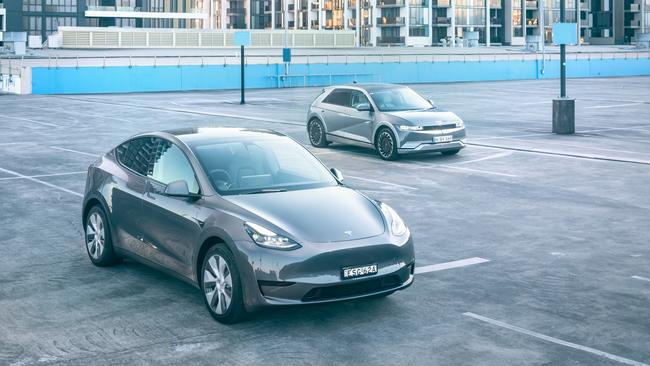
TESLA MODEL Y RWD
The Tesla hype train rolled through town two weeks ago when the company opened its order books for the new Model Y.
Wait times quickly blew out by six months, and Tesla supercharged cost to meet demand.
Prices jumped by more than $3000 to about $78,000 drive-away for the cheapest single motor version – about $8000 more than the equivalent Model 3.
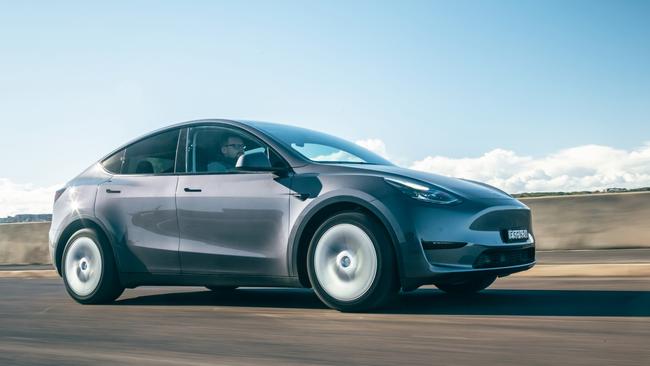
The Model Y shares its motor and battery with the smaller sedan, but is heavier and has larger overall dimensions.
Tesla claims its battery is good for 455km of driving range. Hyundai gets roughly the same range out of a larger, but less-efficient battery.
Tesla doesn’t provide power figures, but it does claim a 6.9 second sprint to 100km/h.
It feels quicker than that in real life.
The Model Y has quick, sharp steering combined with firm suspension to make you crave a strip of twisting tarmac.
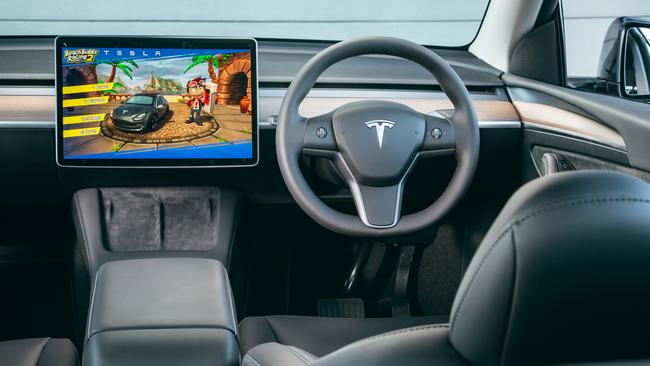
Lighter than the Hyundai, the Tesla’s firmer suspension does an admirable job of controlling its weight over pockmarked streets.
Road noise is an issue, and you’ll hear the suspension thump over bumps.
The Hyundai is much more refined.
Tesla’s egg-shaped design provides efficient aerodynamics over eye-catching aesthetics, though its true beauty lies inside.
You open the car via a phone app, and there is no start button – it’s on when you step in, and off when you select park and get out.
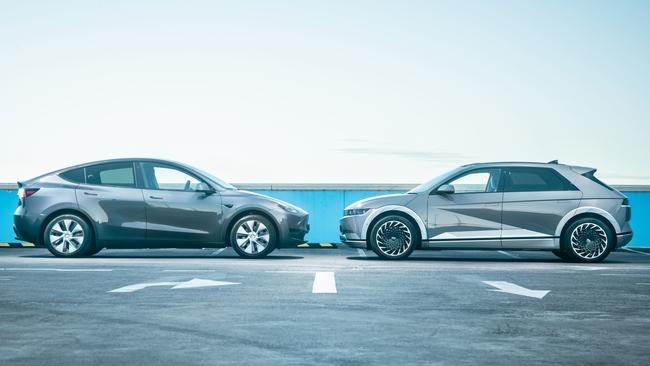
Conventional dials, buttons and switches are nowhere to be seen, with key controls and settings integrated within an enormous 15-inch touchscreen. This includes distracting windscreen wipers and aircon controls.
You can wow kids and guests with clever features such as video games, security cameras, a pet-friendly “dog mode” or even Netflix and YouTube on the central screen.
Over-the-air updates means it’s constantly improving, occasionally surprising owners with new features.
Tesla’s stereo is epic, banging out crisp, high quality audio the competition can’t match.
A full glass roof gives its cabin a spacious feel, though it can be stifling in summer as the design-focused air vents lack punch.
Rear vision is horrible thanks to the coupe-like roofline.
An enormous boot is bigger than you will find in huge seven-seat SUVs.
HYUNDAI IONIQ 5 RWD
The Hyundai Ioniq 5 costs about $77,000 drive-away, and like the Tesla is eligible for a stamp duty rebate in NSW. Limited supply means you could be waiting awhile, too.
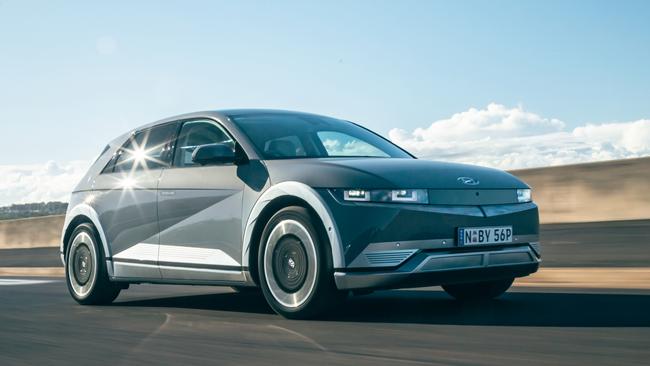
It wins the ownership stakes with a five-year, unlimited kilometre warranty that eclipses Tesla’s four-year, 80,000km guarantee.
Hyundai owners can budget $1684 for five years of maintenance, while Tesla’s lack of capped price plans makes servicing guesswork.
Futuristic styling makes the Hyundai look like something straight out of a video game.
The Ioniq 5 is smartly packaged inside, with storage and charging points scattered throughout. The cabin feels airily spacious, and faux leather seats with heating and cooling trump Tesla’s pews. It lacks the clever apps of Tesla’s touchscreen, but offers the familiarity of Apple CarPlay and Android Auto.
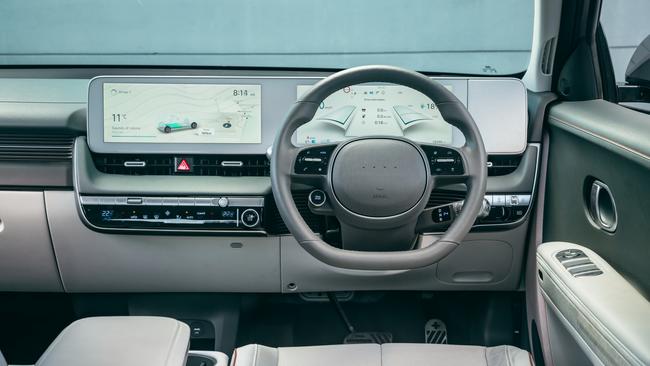
Hyundai accepts a higher rate of charge, going from 10 to 80 per cent in about 18 minutes. But finding a fast charger is still an issue and Tesla’s extensive network of chargers makes it more convenient to top up on the go.
Hyundai packed the Ioniq 5 with safety features including auto emergency braking, blind spot warning and rear cross traffic alert. A bird’s eye camera makes it easy to park and the safe exit system warns of approaching cars.
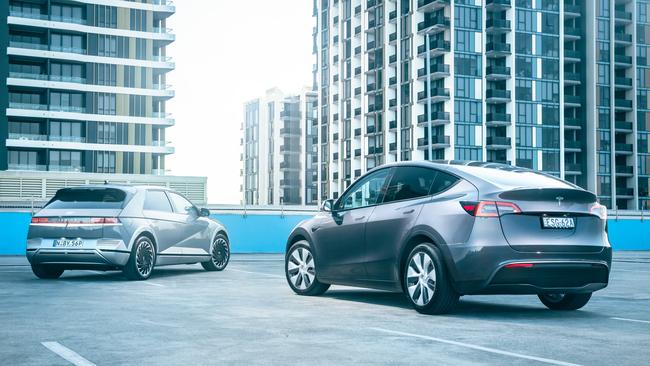
Tesla packages some of these features into its “Enhanced Autopilot” that costs an extra $5000.
On the road the Ioniq 5 is quiet as a mouse, there is a slight hum from the electric motor but road noise is kept to a minimum.
Soft suspension makes for a smooth commute, but it can struggle to control its weight over consistent bumps at speed.
Its steering can feel a little stodgy compared to the Tesla, which shows established brands can learn from new names in the world of electric cars.
VERDICT
Both are immensely impressive electric cars, but the Model Y’s cool features and driving prowess can’t be beat. The hype is real.
TESLA MODEL Y RWD VITALS
PRICE About $78,000
MOTOR Single electric, 192kW/420Nm (estimated)
WARRANTY/SERVICING 4 years/80,000km, no capped price
SAFETY Seven airbags, auto emergency braking, blind spot monitoring, lane keep assist, radar cruise
RANGE 455km
SPARE None
LUGGAGE 854L
HYUNDAI IONIQ 5 RWD VITALS
PRICE About $77,000 drive-away
MOTOR Single electric, 160kW and 350Nm
WARRANTY/SERVICING Five year/unlimited km, $1684 over five years
SAFETY Eight airbags, auto emergency braking, lane keep assist, blind spot monitoring, rear cross traffic alert, exit warning, rear occupant alert, radar cruise, 360 degree camera
RANGE 72.6kWh battery, 451km
SPARE Repair kit
LUGGAGE 584L
Originally published as 2022 Tesla Model Y RWD v Hyundai Ioniq 5 RWD comparison review





